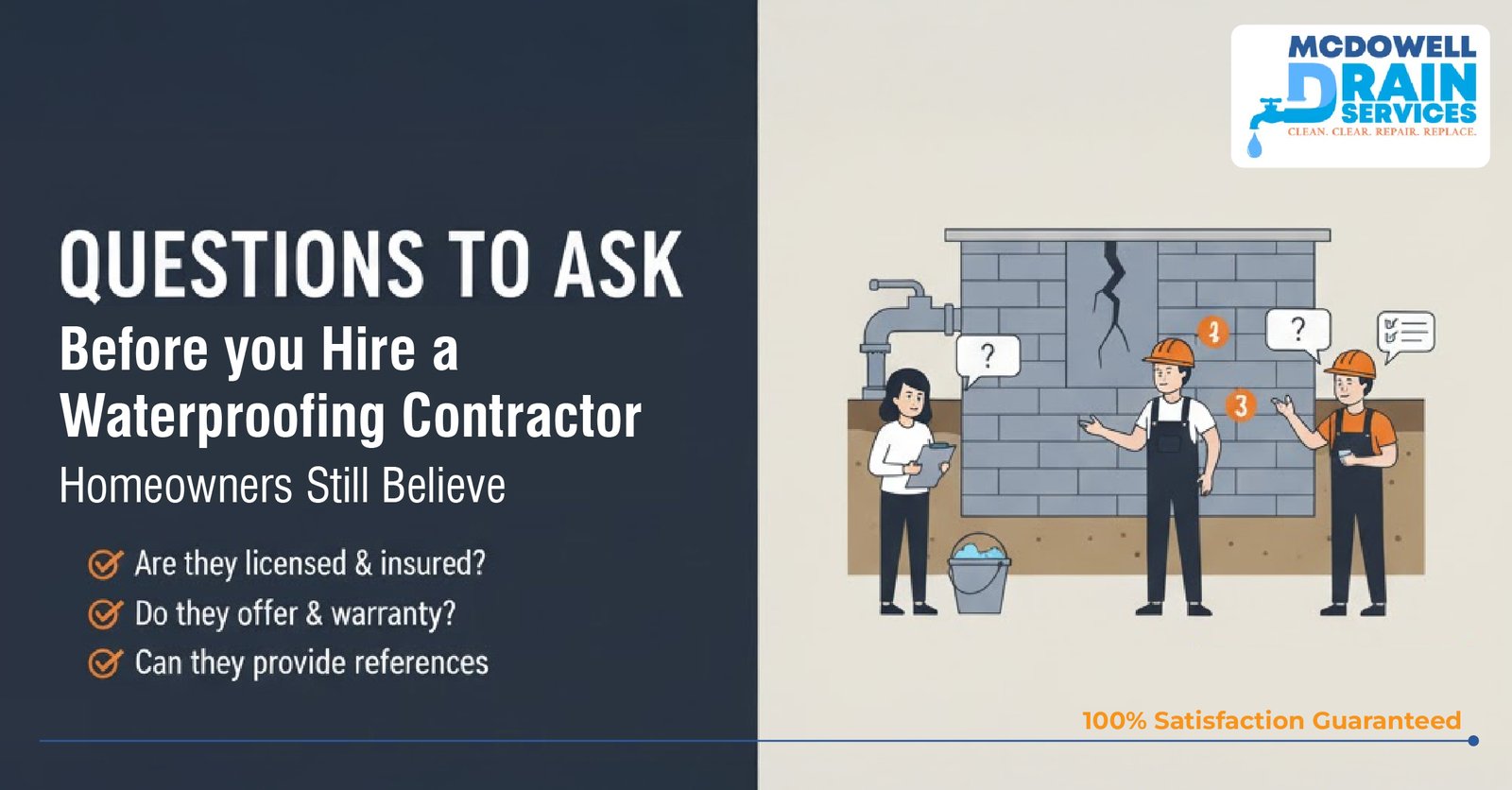Picture this: there’s a small damp patch in your basement. Maybe it smells a bit musty, or you notice a hairline crack along the wall. Most people shrug it off. “It’s nothing,” they think. But water doesn’t stay put.
Bit by bit, it spreads—creeping into walls, floors, furniture, and eventually, the structure itself.
The smart thing to do is deal with it early by bringing in someone who actually knows what they’re doing. But here’s the tricky part: not all waterproofing contractors are reliable. Some give quick fixes that don’t last. Some cut corners. And some give you a price upfront, then surprise you later.
The way to avoid all that? Ask the right questions before you hire. It tells you who’s serious, who knows their craft, and who’s just talking.
1. How long have you been doing waterproofing?
Waterproofing might seem simple at first glance, but finding the real source of moisture takes experience. Someone who’s spent years in the field has seen every kind of leak, crack, and drainage issue.
Ask them straight:
- How many years have you been doing this?
- Have you worked on homes like mine?
- Do you understand the local soil and weather?
For example, if you live in a place with a high water table or older walls, a seasoned contractor will already know the usual problems and the best long-term solutions.
2. Are you licensed and insured?
This isn’t just a formality. A license proves they’re working by the book. Insurance protects you if something goes wrong—whether that’s property damage or someone getting hurt on site.
Ask to see the paperwork. A professional will show it without hesitation. If they dodge or give excuses, that’s your sign to walk away.
3. Can you show me past work or share references?
Good contractors keep records. They’ll have before-and-after photos of finished projects so you can see their quality.
Go a step further—talk to a couple of their old clients. Ask simple questions:
- Did the work finish on schedule?
- Did it actually solve the water problem?
- Were there any hidden costs?
Honest feedback from other homeowners tells you more than any brochure ever could.
4. What’s your plan to fix the problem?
Every basement is different. A pro won’t just throw out a generic solution. They’ll inspect first and the explain cause clearly, and walk you through their plan.
For example:
- Small cracks might get sealed with injection materials.
- Damp walls inside could need drains or vapor barriers.
- Outside water might require regrading, a sump pump, or waterproof membranes.
If they can’t explain it simply, they probably don’t fully understand the issue themselves.
5. Do you give a warranty?
A solid waterproofing job should last for years. Ask them:
- How long is the warranty?
- What exactly does it cover?
- What happens if the issue comes back?
And make sure it’s in writing. A contractor who refuses to give a written warranty isn’t confident in their work.
6. Will you take care of permits?
Some jobs, like exterior waterproofing or sump pump installation, need city permits. Legitimate contractors handle that for you.
If someone says, “You don’t need a permit,” be careful. That shortcut can cause serious problems later, especially if you decide to sell.
7. How long will the job take?
You don’t want a job that drags on forever. Get a clear timeline—start date, expected finish, and what could delay things (like bad weather or material shortages).
A reliable contractor will give you realistic answers. Overpromising here usually leads to frustration later.
8. Can you give me the full cost in writing?
Never rely on a verbal quote. Get a detailed written estimate that includes:
- Labor
- Materials
- Permits
- Cleanup
- Payment stages
Avoid anyone who wants the full payment upfront. Good companies work in stages, so you pay as the job progresses.
9. Who will actually be on-site?
Sometimes the person who gives the quote isn’t the one doing the work. Find out:
- Who’s actually working at your place?
- Who’s supervising?
- Who do you talk to if something goes wrong?
Knowing this upfront avoids confusion once the work starts.
10. What if new problems show up?
Once the work begins, hidden issues sometimes surface—extra cracks, leaking pipes, foundation problems. A good contractor won’t just keep going and bill you later. They’ll:
- Stop and show you the issue.
- Explain your options.
- Give you a new estimate.
- Only continue if you agree.
That’s how you avoid surprise costs.
Quick Reference Table
| Question to Ask | Why It Matters |
| Experience | Seasoned pros give lasting fixes |
| License & Insurance | Legal and financial protection |
| Past Work & References | Real proof of quality |
| Repair Plan | Shows they understand the issue |
| Warranty | Long-term peace of mind |
| Permits | Keeps everything legal |
| Timeline | Avoids delays |
| Written Cost | No surprise bills |
| Who’s Working | Clear communication |
| Extra Problems | No hidden charges |
Final Thoughts
The major thing waterproofing isn’t just about plugging a hole. It’s about protecting your home for the long run. Choosing the right contractor saves you from repeat work, unnecessary stress, and wasted money.
Take your time. Ask these questions. Pay attention to how they answer. The good ones will be open, patient, and clear.
Getting this right once means you won’t have to deal with it again anytime soon.


